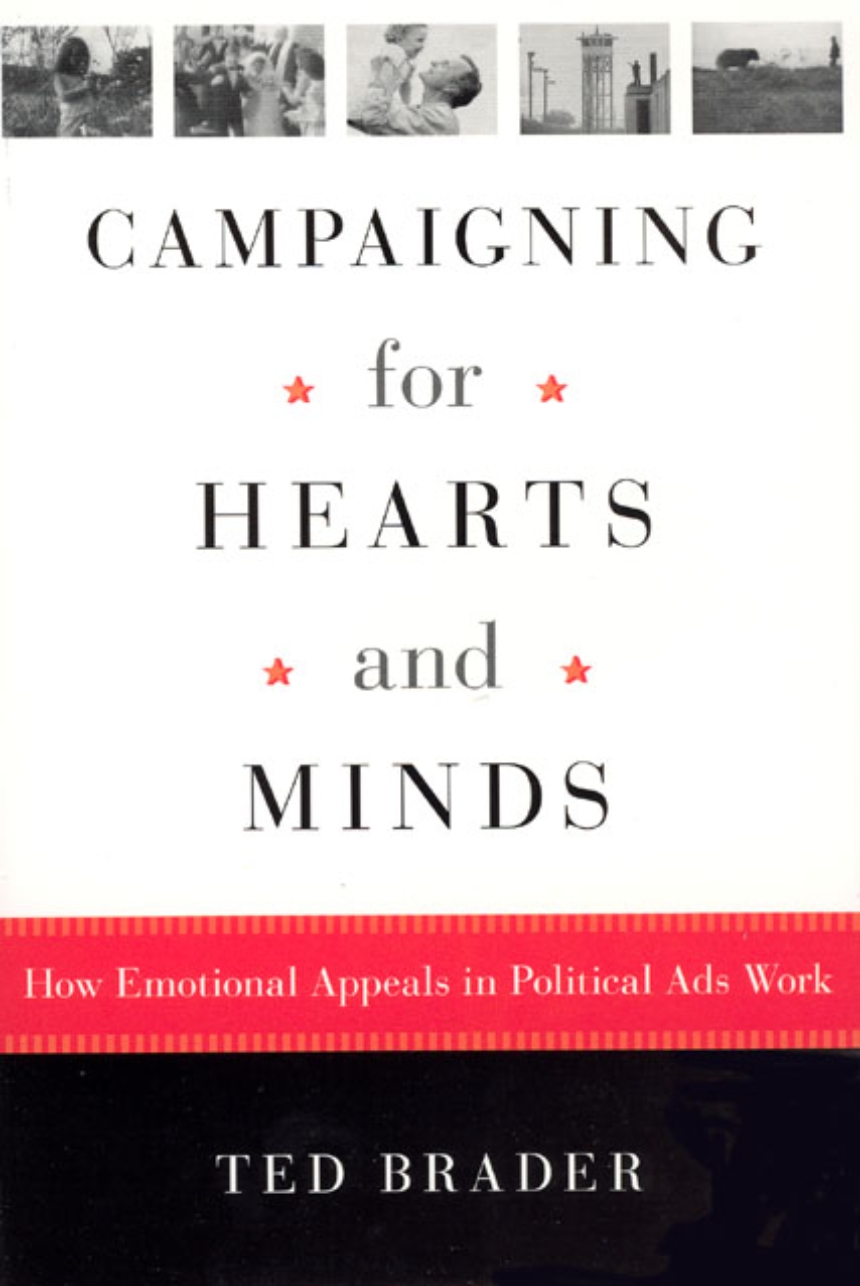Campaigning for Hearts and Minds
How Emotional Appeals in Political Ads Work
9780226069890
9780226788302
Campaigning for Hearts and Minds
How Emotional Appeals in Political Ads Work
It is common knowledge that televised political ads are meant to appeal to voters’ emotions, yet little is known about how or if these tactics actually work. Ted Brader’s innovative book is the first scientific study to examine the effects that these emotional appeals in political advertising have on voter decision-making.
At the heart of this book are ingenious experiments, conducted by Brader during an election, with truly eye-opening results that upset conventional wisdom. They show, for example, that simply changing the music or imagery of ads while retaining the same text provokes completely different responses. He reveals that politically informed citizens are more easily manipulated by emotional appeals than less-involved citizens and that positive "enthusiasm ads" are in fact more polarizing than negative "fear ads." Black-and-white video images are ten times more likely to signal an appeal to fear or anger than one of enthusiasm or pride, and the emotional appeal triumphs over the logical appeal in nearly three-quarters of all political ads.
Brader backs up these surprising findings with an unprecedented survey of emotional appeals in contemporary political campaigns. Politicians do set out to campaign for the hearts and minds of voters, and, for better or for worse, it is primarily through hearts that minds are won. Campaigning for Hearts and Minds will be indispensable for anyone wishing to understand how American politics is influenced by advertising today.
At the heart of this book are ingenious experiments, conducted by Brader during an election, with truly eye-opening results that upset conventional wisdom. They show, for example, that simply changing the music or imagery of ads while retaining the same text provokes completely different responses. He reveals that politically informed citizens are more easily manipulated by emotional appeals than less-involved citizens and that positive "enthusiasm ads" are in fact more polarizing than negative "fear ads." Black-and-white video images are ten times more likely to signal an appeal to fear or anger than one of enthusiasm or pride, and the emotional appeal triumphs over the logical appeal in nearly three-quarters of all political ads.
Brader backs up these surprising findings with an unprecedented survey of emotional appeals in contemporary political campaigns. Politicians do set out to campaign for the hearts and minds of voters, and, for better or for worse, it is primarily through hearts that minds are won. Campaigning for Hearts and Minds will be indispensable for anyone wishing to understand how American politics is influenced by advertising today.
280 pages | 52 halftones, 30 line drawings, 14 tables | 6 x 9 | © 2005
Studies in Communication, Media, and Public Opinion
Political Science: American Government and Politics, Political Behavior and Public Opinion
Reviews
Table of Contents
List of Tables and Figures
Acknowledgments
1. Appealing to Hopes and Fears
2. The Art and Science of Campaigning
3. The Political Psychology of Emotional Appeals
4. Emotion and the Motivational Power of Campaign Ads
5. Emotion and the Persuasive Power of Campaign Ads
6. Emotional Appeals in Ad Campaigns
7. Hearts and Minds: Rethinking the Role of Emotion in Political Life
Appendix A. Experiments: Question Wording and Sample
Appendix B. Multivariate Statistical Analyses: Full Results
Appendix C. Advertising Content Analysis: Coding Rules
Notes
References
Index
Acknowledgments
1. Appealing to Hopes and Fears
2. The Art and Science of Campaigning
3. The Political Psychology of Emotional Appeals
4. Emotion and the Motivational Power of Campaign Ads
5. Emotion and the Persuasive Power of Campaign Ads
6. Emotional Appeals in Ad Campaigns
7. Hearts and Minds: Rethinking the Role of Emotion in Political Life
Appendix A. Experiments: Question Wording and Sample
Appendix B. Multivariate Statistical Analyses: Full Results
Appendix C. Advertising Content Analysis: Coding Rules
Notes
References
Index
